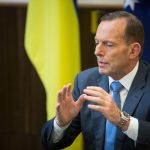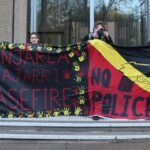Pair Refused Bail on Charges of Financing Terrorism

A 20-year-old man and a 16-year-old girl were recently arrested in Guildford on charges of financing terrorism. Counter-terrorism police allege that the pair were involved in obtaining money to send overseas to assist ISIS.
Police claim the 16-year-old schoolgirl has admitted to following the instructions of notorious ISIS fighter Ahmed Merhli to send money overseas, although they have not released details of her understanding of who she was sending the money to, or what she says she thought it was for.
During bail proceedings in Parramatta Children’s Court, Magistrate Paula Russell refused to release the girl, refuting defence suggestions that the prosecution case is weak prosecution and “questions of entrapment that lurk in the evidence”.
Financing Terrorism
Division 103 of the Criminal Code imposes a maximum penalty of life imprisonment where a person provides or collects funds to facilitate or engage in a terrorist act.
The prosecution must prove that the defendant was aware that their actions were for those purposes, or were ‘reckless’ to that fact.
In the words of the Attorney-General’s Department:
“A person finances terrorism when they intentionally collect or provide money and are reckless about whether the money will be used to facilitate or engage in a terrorist act.”
In other words, a person may be guilty if they were aware of a substantial risk that the funds would be used for terrorism purposes.
The Division also changed the words “the terrorist act” to “a terrorist act”, removing the requirement of proving a specific activity.
Under Division 100 of the Criminal Code, Terrorism is defined as “an action or threat which causes certain defined forms of harm or interference… done with the intention of advancing a political, religious or ideological cause” through coercion and intimidation of the government and/or the public.
It does not include advocacy, protest or industrial action that is not intended to cause serious harm to others.
Monitoring Suspects
AUSTRAC acts as Australia’s financial intelligence agency, and is currently monitoring more than 100 people suspected of funding terrorism.
The agency, which is responsible for gathering information about money laundering and terrorism-financing, has recorded a 300 percent increase in the number of terrorism-related “suspicious matter reports”, from 118 in 2013/14 to 367 in 2014/15. It says these reports amount to approximately $53 million in funding, of which $11 million is cash.
A recent AUSTRAC report attributed the spike to Syria’s four-year civil war, with 120 Australians believed to now be in Syria and northern Iraq.
Justice Minister Michael Keenan has emphasised the growing need to combat terror ¬financing:
“Terrorists and organised crime groups cannot operate without financial backing or a way to launder their dirty ¬profits,’’ he said. “Cutting off their money supply goes a long way to shutting down their ability to carry out their atrocious acts.’’
Concerns
While the threat of terrorism in Australia is ever-present, it is important not to discard fundamental protections and create a state where people lose their rights on a mere suspicion, or have to prove their innocence from behind bars rather than the (well-resourced) state having to establish their guilt.
There are already serious concerns over a whole range of encroachments on our rights, justified on the basis of a terrorism threat; including:
- The onerous ‘show cause’ provisions in the Bail Act which are keeping people behind bars on a mere suspicion,
- the reversal of the burden of proof for certain offences,
- the use of preventative detention orders where people are kept behind bars for significant periods of time without charge,
- immunity from both civil and criminal prosecution for raids in cases where law enforcement agencies point the finger, even if heinous acts are committed by agents on innocent people.
It is important to be aware that these laws can affect anyone, including innocent families in the sanctity of their own homes. An example was a large-scale operation which involved simultaneous raids of two-dozen homes in the early hours of 18 September 2014 by over 800 officers, including heavily armed personnel. Those raids led to two just two arrests, one person charged and no convictions to date.
Several families were terrorised during those raids. One family spoke out about how the mother was dragged from her bed semi-naked and two children were assaulted. The family reported the matter despite laws which make it a criminal offence to disclose or publish information about ‘special intelligence operations’; regardless of the outcome.
Unfortunately in the current climate, it appears that just about any law can be passed – supported by both major parties – by pointing to the threat of terrorism, regardless of the potential ramifications.






